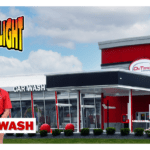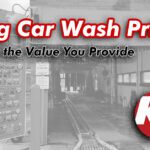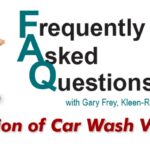The impact of COVID-19 was sudden and immediate. Within days, citizens and businesses across the country had to change their behaviors. Everyone began to take drastic measures to avoid spread and contamination. Communities were forced to grapple with new circumstances and uncertainty.
For car wash owners, detailers, and power washers, it was a drastic shift in gears taken over the course of days – not weeks or months, which is how many of our business decisions are made. There was little time for deliberation.
Now, as we have moved on from the initial shock, we can take a look at what effect COVID-19 has had on our industry, and on businesses and operators across the country.
Changing Rules
Across the country, every state dealt with business closures differently. For single-location operators, this meant finding out what local and state restrictions were and figuring out how to meet them.
For operators with locations across different states and even different regions of the country, this meant a larger undertaking.
An Operator’s Perspective
Steve Sause, of Cloud10 Car Wash, has locations across four states, covering much of the Northeast as well as Florida. It was important to him to take immediate action, coordinating responses over those locations and responding immediately to the challenges. “By March 18th, I had all of my stuff in place. We knew it was starting to happen on the 10th of March, but by the 18th we were fully engaged.”
They tackled the waivers in states that required them immediately, prioritizing them. Beyond that, demonstrating preparedness went a long way towards staying open, says Sause. “Just having the stuff on site, and showing the local municipality, the state… anybody that wants to know that you have a plan in place and you have PPE, gives you an edge.”
Addressing the wrinkle of changing regulations across state lines, and making sure they were within each state’s guidance, has been a challenge. Sause went with the idea that there was no such thing as being overprepared. “I took the most strictest and severe impact guidance, and I applied that across all locations… my feeling was, at worst, I was doing more than some of the local municipalities suggested, and at best I was doing the best I can for my employees and customers.”
Sause was able to accurately sum up the feelings of many of the operators that we talked to when it came to making those purchases necessary to keep business moving. “There wasn’t any, like, oh, we shouldn’t spend the money or do this or that… what is it going to take to do what we’re supposed to do? That’s what matters.” It was just the matter of knowing what would work, what would be approved, and what was necessary to stay open.
Another Operator Experience
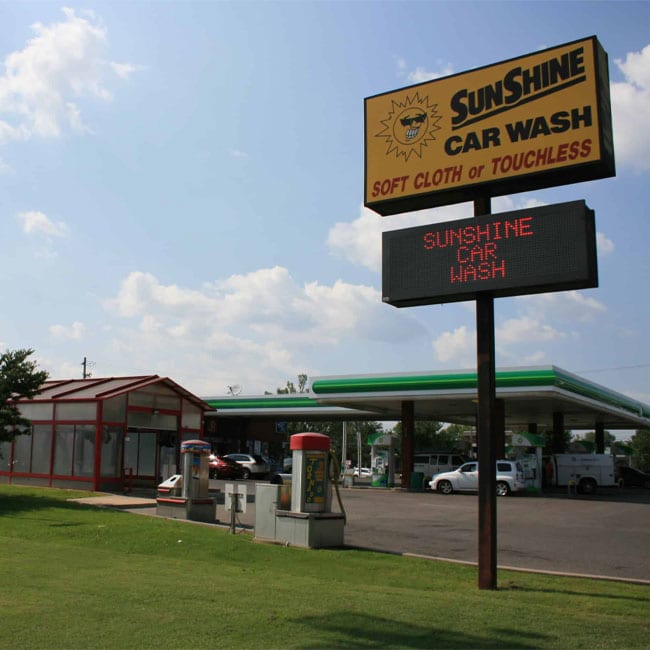
Unfortunately, not everyone had the same experience as Sause. Glen Little, of the Sunshine Car Wash Group, had to tackle a variety of legislation. Like Sause, he had to manage requirements across various municipalities and states, but there were a variety of responses. The governors in Mississippi and Tennessee allowed his washes to stay open as usual. But at a more local level, the mayor of Memphis barred them from operating within the city limits.
“The ones on the outlying areas… like in North Mississippi, those were open, some of the suburbs like Collierville and Germantown – still inside the county but a separate town – they were open, it was just the ones inside Memphis that were hit.”
Further complicating things, the mayor even dictated what services could be offered at what stages. Tunnels and automatics were open first, but self-serve and vacuums had to remain closed. This impacted the washes that relied on these services and directed business to the tunnel and automatic washes. More time passed before the self-serve were open, putting the operators behind.
Almost every operator we talked to agreed that the state and local guidance could have been better and more consistent. While most felt the states had responded as well as they could, communication and response left room for improvement.
When Closing is Not an Option
Early on, the argument of whether or not a business constituted an essential business came into play. Car washes were not immune to this discussion. It’s not just that they provide essential income for owners and employees. They also provide excellent services for the community, such as sanitation services for drivers including municipal and medical transportation. Those services muddied the waters in many locales in regards to determining whether or not they were to stay open.
As the International Carwash Association (ICA) highlighted in their valuable COVID-19 resources for carwash owners, under CISA guidance, car wash owners and mobile pressure washing teams could represent that their businesses were essential for a number of reasons, with essential business and workers including:
- Workers providing disinfection services for all essential modes of transportation
- Workers critical to rental and leasing of vehicles and equipment that facilitate continuity of operations for essential workforces and essential travel
- Automotive maintenance facilities
- Worker supporting the safe transportation of chemicals, including those supporting tank truck cleaning facilities
Curtis Tremblay, operator of the Bubbles Car Wash chain of washes in Arizona, knew that it would be important for him to stay open. He noted that “one of my washes gets ambulances, FedEx trucks, UPS trucks, we get a lot of the medical units.” Providing valuable cleaning and sanitation to essential services meant that closing the high bays wasn’t an option. “We get a lot of the medical stuff, so we wanted to make sure we stayed open.” At the same time, he says, “I wanted my guys protected too.”
Stepping up Sanitation
Taking immediate steps, Tremblay made gloves and masks the priority, even having masks shipped across the country to ensure that his team was protected. Disinfection of every touchpoint in the bays became a priority as well, with his employees doing lot checks more often than ever before and disinfection rounds numerous times per day.
Sause notes that they addressed all sorts of danger points in their move to address sanitation and did it right away. “I immediately was ordering large quantities of disinfectant… I stocked up on every disinfecting and sanitizing product I could get my hands on and shipped it to my locations.”
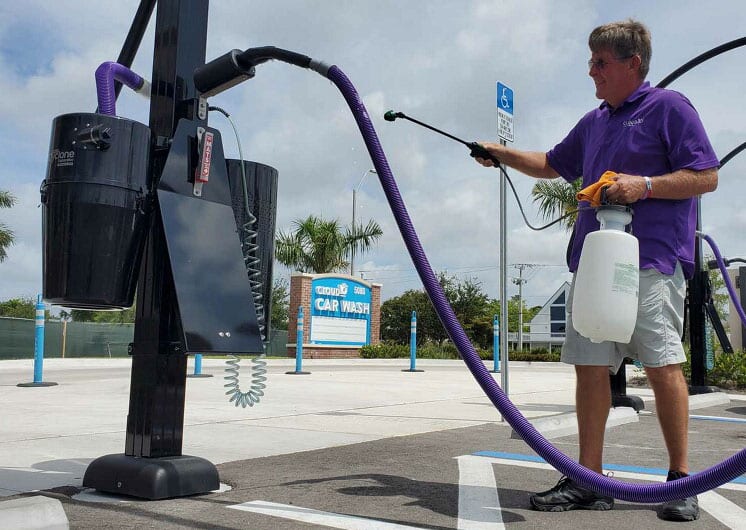
Steps taken by car washes to combat COVID-19 included:
- Cordoning off some vacuums so there was an empty vacuum between each vehicle
- Wearing face masks and gloves throughout all interactions
- Disinfecting touchpoints between cars
- Spraying down vending machines, handles and knobs in bays, and more between customers
- Expecting employees to wash hands as prescribed after lot checks, customer interactions, and arriving or leaving throughout the day.
In some cases, limiting customer behavior was an unfortunate step that had to be taken. From shutting down community coffee pots, to placing bathrooms off-limits to non-employees, the areas where the virus could be transmitted were reduced and contained.
Sanitation isn’t just for the customers either. As all the owners we spoke with noted, their staff is important to them. Beyond the liability issues of poor sanitizing practices, it simply comes down to protecting those who are close to you. The sanitizing wasn’t just to protect the customer, or to protect the bottom line – it was to protect the family that they had built at their washes.
Disinfecting and Sanitizing Details
It’s important to remember the difference between simply cleaning versus effectively sanitizing. Cleaning a surface with regular soap or materials like vinegar only removes dirt and other larger particles. Sanitizing means you actually disinfect a surface and remove potentially dangerous germs and virus molecules.
Products like Lysol wipes, Clorox, and hydrogen peroxide are acceptable for sanitizing small areas in office spaces, waiting areas, and break rooms. Areas that see heavy traffic at your car wash require bulk disinfectant products that you probably don’t normally stock. It’s important that the disinfectants you purchase are approved to kill Covid-19. The EPA has a full list of approved products on their website. Kleen-Rite has made a note in the product information for all of the EPA-approved products that we sell. If you don’t see a specific note about EPA approval, we cannot guarantee that the product removes Covid-19.
Never combine disinfectants and cleaning agents unless you are absolutely sure it is safe. Mixing chemicals can create toxic fumes that are very hazardous. You can use the same towels or pads that you’d normally use to apply cleaning product or scrub surfaces, but it’s highly recommended that those items be disposed of after one use to avoid moving virus molecules from one area to another.

Masks
Short of a full respirator, N95 and KN95 masks have the greatest ability to block harmful particles. These masks block 95% of small (as small as .03 microns) and large particles in addition to containing saliva and droplets from the mouth of the wearer. Please note that because N95 masks act as a filter, they can affect breathing and oxygen supply.
Three-ply surgical masks are commonly used among surgeons, nurses, and other healthcare professionals. They are more loose-fitting and do not create a seal between the mask and skin like an N95. They block splashes, sprays, splatters, and droplets that may contain virus and bacteria. Surgical masks also limit the spread of liquid from the mouth and nose of the wearer.
For non-healthcare environments, simple cloth masks are sufficient to block the spread of liquids from the nose and mouth. These are either made at home or purchased at hardware shops, clothing stores, and more. Cloth masks don’t have formal guidelines but should be as dense as possible without causing discomfort to the wearer. Masks should also fit as close to the face as possible.
The CDC still recommends reserving N95 and surgical masks for healthcare employees and first responders. If you choose to use these masks when cleaning potentially infected areas or around somebody you fear has the virus, please use as sparingly as possible (but remember, do NOT reuse).
N95 and surgical masks are disposable and should not be reused or shared. After use, wrap in plastic and dispose in a safe waste receptacle. Do NOT share cloth masks but DO wash them regularly.
Face Shields
Face shields are made with sturdy plastic materials like PET plastic. A face shield typically has an elastic strap to secure it to the head, with a section of foam on the forehead for comfort. Shields provide a solid layer of protection between harmful airborne materials and the mouth and nose. They are typically used in conjunction with a mask of some kind.

Hand Washing and Sanitizing
You’ve heard it many times by this point, but you simply can’t hear it enough: wash your hands, wash your hands, wash your hands! It is the easiest and most effective way to reduce the chances of contracting and spreading Covid-19. This means you should also encourage customers and employees to regularly wash their hands. Keep restrooms and sinks clean and fully stocked with soap and hand towels. It’s also a good idea to have touch-free soap dispensers to limit contact.
As a reminder, you should follow the procedure recommended by the CDC when washing hands. Vigorously scrub hands with soap and water that reaches beyond the wrists. Make sure to scrub fingers and get underneath the fingernails while washing.
Either to replace hand washing areas, or as a complement to them, hand sanitizing stations should be available to customers and employees. Hand sanitizers should be at least 60% alcohol (this is also a reliable guideline for alcohol-based disinfectants) to achieve proper sanitization. You can also stock up on small bottles of hand sanitizer for resale at your car wash. This promotes a safe environment while providing a small profit stream at a time when revenue may be down. You can also pass small bottles out to employees so they can constantly sanitize their hands with ease.
Gloves
When used properly, gloves can provide a barrier between the hands and potentially infected surfaces. They also cut down on the surfaces that the wear comes in direct contact with, limiting the chance that they may spread Covid-19. Disposable nitrile gloves provide proper protection while still cost effective. Always stock a variety of sizes so employees can choose the one that provides the best fit for their hands.
Nitrile gloves are the most puncture resistant of all rubber-type gloves. They can be dyed different colors, making it easier to see puncture holes. Nitrile gloves are is chemically resistant, so they’re great for cleaning tasks. They’re also available with a textured design that provides excellent gripping ability.
Do not wear gloves for extended periods of time or use over multiple surfaces. If not used once and thrown away, there is a serious risk of spreading germs from one surface to another. Change gloves frequently and always maintain a routine of regular hand washing or application of hand sanitizer. In some cases, you might even be better off skipping the gloves and instead be extra fastidious about washing your hands.
Shift in Customer Behavior
Operators across the board saw an overall drop in customer visits, and many saw that customer behavior changed as well. Topher Harding, of Foam and Wash in upstate New York, noted that customers have been more diligent in observing distancing and preventative measures. “I have noticed some change in customer habits – about 60-75% put a mask on before speaking with us… and about 1 in 100 people refuse to roll their window down whatsoever.”
Cloud10’s customers took a wide variety of approaches, according to Sause. “Right down to some people putting cash on the windshield wipers – they stop, and put the money on the wiper, and then they pull up. People are not rolling their windows down, they are bringing paper and writing notes and riding through.”
Unexpected Shifts
In Arizona, Tremblay did notice some distinct shifts – some more troubling than others. Relying mainly on self-serve bays, he noted that while customer visits were down, more customers were coming per car, and customers were spending more time in the bays. “Instead of us getting a car in there with one guy, we ‘d get a car in with three guys… a car in with a family of people just to wash the car, because they’re going crazy at home. We were having back-ups in the bays, not because we were making more money, but because people felt secure in those cubes.”
Unfortunately, the virus also brought around another issue, with anxiety and shortened tempers driving up some confrontations. For instance, customers pushing back against requests to move forward, or getting impatient while waiting for a bay to open up. As Tremblay notes, they sometimes had to direct traffic and point out to people where they could pull ahead to.
Everyone noted that credit card sales have gone up, and that there was similar wash plan usage to the period prior to the pandemic. Many drivers with unlimited washes and monthly plans were taking more opportunities to capitalize on them. They seemed to be using them as a reason to go out and take a drive, to get out of the house.
Dealing with Low- and No-Contact Purchasing
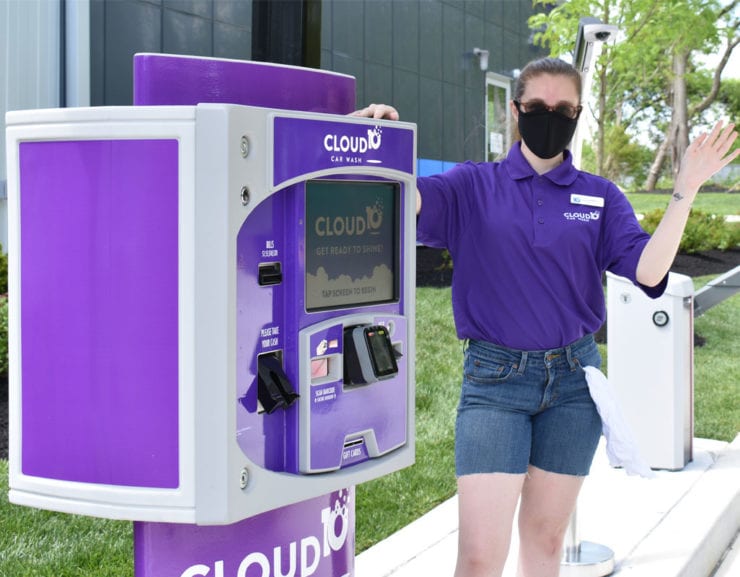
With the push to low-contact and no-contact services across the country – just order a Domino’s pizza on the app and they’ll leave on the chair by the door, Zoom meetings, waving credit cards instead of handing them over – car washes and detailers had to adapt.
Sause put his vote of confidence behind CryptoPay systems, saying “I bought bunches of CryptoPay units from you guys [Kleen-Rite] and put them in my bays, it’s a lot easier than touching quarters and everything else – make it easier for the customer to pay.”
Foam and Wash took a similar track, integrating QR code scanning in the no-contact purchasing process, as these can be scanned and utilized even from behind a glass. While the QR code technology may have seemed like a fad when it was introduced a decade ago, the COVID-19 pandemic has provided it an opportunity to shine as a versatile tool.
Smartphone Apps
Washes that have already invested in smartphone apps noted an uptick in app usage as well, while others pushed development at an accelerated pace. Providing the ability for a complete no-touch, no-interaction experience with peace of mind for the user is going to be a valuable tool moving forward, and likely will begin to replace face-to-face transactions, coin or token drops, and cash exchange.
Owners also saw the value in automated wash plan memberships. Both license plate recognition (LPR) and RFID vehicle tagging programs allow members to pay online from their phone or at home, trigger gates and washes without opening their windows, and be processed without interaction. Plans can be upgraded or modified from home and can allow for multiple vehicles to be added to a single account. Many owners we spoke with noted that their membership plans stayed consistent over the recent months, while a handful even saw an uptick in membership usage once customers realized the efficiency and the ability to be hands-free.
Business Opportunities Emerge
Sause recognized that this pandemic has opened up some business opportunities for the savvy operator.
“I ordered a couple of steamers… so we can steam and disinfect and do things for vehicles… those services will go through the roof once people are comfortable with other people getting in their cars.” Steam cleaning soft surfaces, cleaning and disinfecting hard services using RTU disinfectors, and other services are seeing interest from customers, and smart operators will be able to capitalize on it. Sause went as far as to swap out self-service bays for full-service interior cleaner at a location.
Specific interior anti-viral and anti-bacterial sanitizing treatments utilizing chemicals and products previously seen primarily hospitals, schools, and food processing facilities were added to the services list at some car washes. These virus- and bacteria-killing treatments have shown themselves to be safe for car interiors, and come from trusted names including Simoniz and National Automotive Chemical in both undiluted and ready-to-use quantities.
Some operators saw the potential for expanding self-serve interior cleaning offerings beyond the standard vacuums. From offering updated vending interior cleaning kits, to lowering the price on vending cleaning kits to entice virus-wary customers to make a purchase they may have skipped in the past, to offering retail and vending options like single-use disinfectant towelettes or small bottles of hand sanitizer that can be stored in consoles and glove compartments, new profit points sprang up as time passed. In providing these to customers at reasonable pricing, operators have been able to cement their place as community-minded individuals who are looking to help their customers feel safe, not capitalize on dark times as some retailers and online price gougers have done.
“Are volumes down? Yes. Revenue down? Absolutely. Are customers thrilled that we’ve stayed open
because it’s something they can do on their own? More than you could understand.”Steve Sause
Surprising Side Effects
Some operators noted some surprising side effects from the guidance, regulations and habits coming out as part of the response.
At Bubbles Car Wash, Tremblay noted that the opportunities for maintenance that are usually present in the early part of the year weren’t there. Particularly when isolation suggestions started rolling in, he was prepared to do work – “I thought, we’re going to have all of the maintenance done in a month because there’s not going to be anybody here… I told my guys, you got a job, even if they make us close, you have a job, I’m going to keep you busy, you’re going to be doing maintenance.” However, the regular, longer visits by customers meant “we never could get it done… there’s been cars everywhere, hanging out.”
This resulted in skipped maintenance that will need to be caught up on as time goes by, as well as unexpected downtime that has resulted in on-the-fly repairs instead of planned work. Pushing equipment to or past the normal maintenance date is certainly testing the limits of the equipment. In some cases, it is even highlighting holes in maintenance programs, or indicating pain points operators haven’t dealt with in the past.
Affects Differ by Business Model
Tremblay also saw that different business models were taking it harder than others. For instance, he notes, “this one car wash, you pull it up, the guy puts it on the belt, it goes through, another guy takes it out, other guys wipe down the windows… that place is dead.” Full-service washes have taken a hit, simply because of the amount of touching and the amount of staff involved. With everyone becoming sensitive to who they have in their personal space, and your car being where you spend the third-most time of your day behind home and work, many customers are reluctant to allow those outside of their close circles into their space.
There were other issues as well – with emergency services diverted, some operators had to resort to neighborhood watch-style coordinated efforts, like in the case of Tremblay and some of his fellow operators in the Scottsdale region. With officers not patrolling, they took it on themselves to take turns checking in on each other’s washes when they could.
That same lack of police presence impacted Little’s group of washes. He saw that when they were closed up their washes, he “had a record amount of vandalism. People coming in and spray painting the bays, people coming in and writing stuff on the ground in the bays… it was just unbelievable.” With services focused elsewhere, and lack of consistent employee presence, operators needed to be mindful of security.
The New Normal
Where we go from here is the next question. With some states throwing the doors wide open, while others are participating in measured reopening steps, we will be adapting to the “new normal” over the coming months. New habits, new practices, new customer desires.
All of the operators we talked to expect that this isn’t over. The coronavirus will not disappear – it will be something to contend with for months and possibly years to come. Many that we spoke with felt that current sanitizing and disinfecting standards will continue a significant amount of time. As Tremblay pointed out, everything from cleaning procedures and new offerings are here to stay in one form or another – “I think it’s going to be this way… I think this is going to be our new way of life.”
Many urged that, where possible, operators should stock up on preventatives, disinfectants and more, even as the nation feels a lull or a retreat of the virus. This could be coming back – two months, four, six – and operators should be better prepared for a potential resurgence, learning the lessons from the first wave. Even if there isn’t a massive second wave, with flu season and the potential for future pandemics, keeping an inventory of low-cost PPE and disinfectants on hand will prepare businesses for future disruption.
The investment in new technology has also pushed profit projections higher for some wash operators. It’s true that necessity is the mother of innovation, and the idea of no-contact processing – especially through tunnel and IBA setups – is likely to only continue to expand in the pandemic downslope, and the operators who can adopt it best are the ones that are likely to see continued success.
I think it’s going to be this way… I think this is going to be our new way of life
Curtis Tremblay
What’s Next?
Learning from what has happened will help us to be ready for what will happen. Hope for the best, prepare for the worst.
The operators we spoke with all talked of the need to be better prepared. It’s not a time to be scared – it is a time to consider how you can evolve your services. Change your processes, and upgrade your systems to become more efficient than before. It could be new security to protect against damages in the future, new products for disinfecting, or new pay systems.
There will be opportunities for the smart businessman as well. With interest rates dropping to encourage spending, judicious upgrading and expansion through borrowing could allow some businesses to capitalize. While we have seen some minor delays in customers who were working on expansion, few have shelved their efforts. Some are continuing to seek out opportunities even though the bounce back may still be months away.
Here at Kleen-Rite, you can bet we’ll continue to be by your side regardless of what comes next. We’re here to help you succeed with the chemicals, the equipment, and the knowledge that will help you evolve and compete – reach out to us today!


